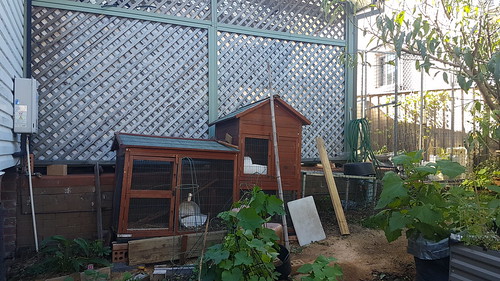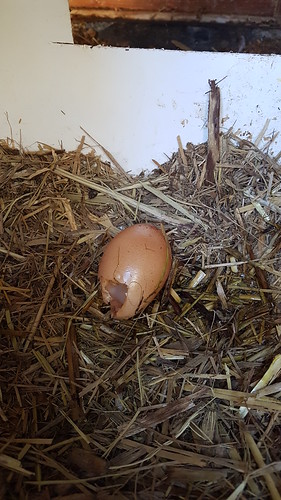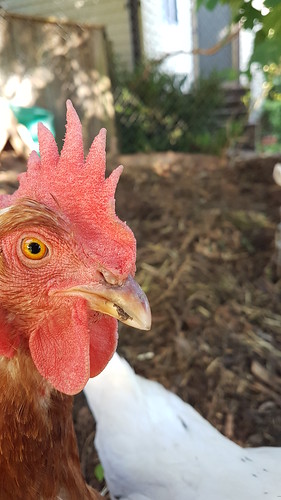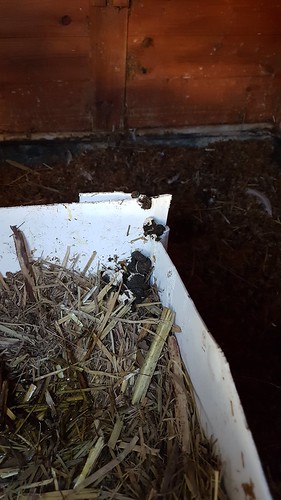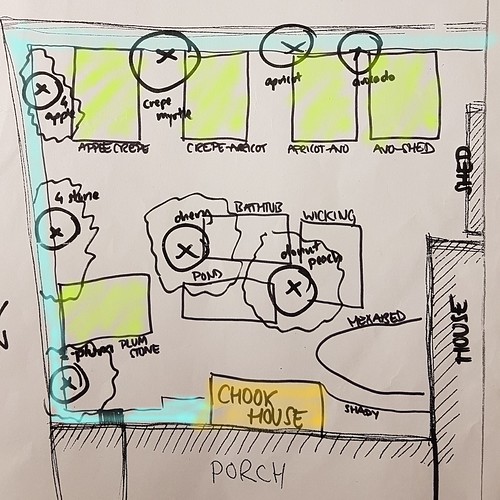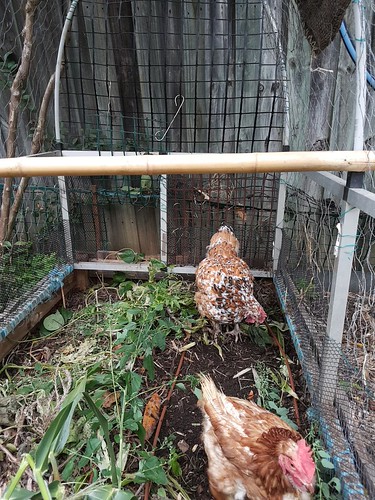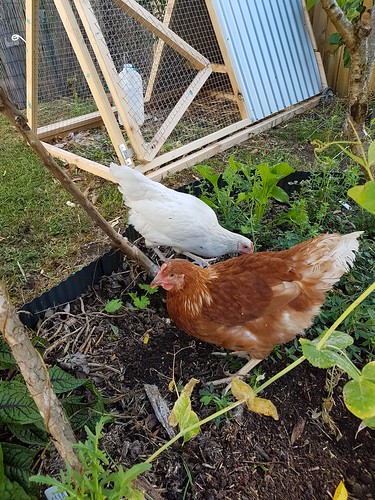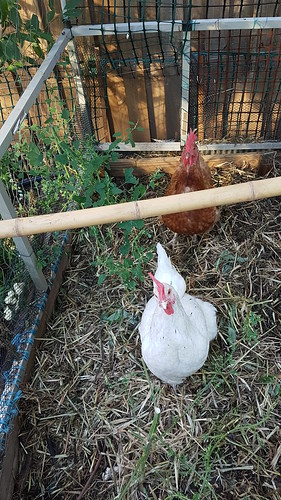0. Real Chooken Keeping
1. Somewhere To Park The Henhouse
2. Care and Feeding
3. Eggs and All That Jazz
Chickens are at once amazingly sturdy birds (from a start in South-East Asia, they survive in just about any climate with a little bit of care) and incredibly prone to disease and sickness when improperly cared for.
We'll start with the sturdy front.
They will eat anything that humans consider 'food' and quite a few things that humans don't consider food. They are not as indiscriminating as goats who will eat literally everything, but they are pretty good with all kinds of human foods. Also: with grass, flowers, vegetables, certain perennials. Additionally, bugs, insects, lizards, vermin.
green things
I said that chooks will pick at any greens they find in reach - including your vegetable garden. No, they can't be taught to differentiate between grass and lettuce. There isn't enough space in that teeny tiny brain for anything as complicated as 'this is something that the great, wise, good feeder doesn't want you to eat'. So they will nibble at everything. Including some fruits and vegies if you let them.
My chooks actually quite love green leafy things. Some green leafy things are more pleasurable than others - you should hear the noises Hainan makes when she gets atop a shrub and starts simultaneously scratching and pecking it to death.
Hainan: 1. Plant: 0.
My garden is set up to use the chickens as cleaners once I've finished growing in a bed. They get let into the garden bed under a chook tractor and may eat whatever I've left in there - along with some things that I tossed down to grow specifically for them: "clucker tucker". I bought the mix of seeds from Diggers Club, but there are options for edible things like oat seeds, dry chickpeas, fennel, fenugreek, coriander, and any number of other 'weed' seeds of which the chooks make fast work. I now have fat hen, among other weeds which will be enthusiastically fed to delighted chooks.
If you don't have that much space or a tractor to put over the top of the chickens, then an option might be to grow trays of green chookfeed: let them nibble it down to the stem, then take it away and replace with another tray. It takes timing, but so does tossing down chook fodder seeds in the garden ready for when the chook tractor is fitted on.
But the green things are just the start.
pecking away the pests
Chickens eat a lot of insects and bugs.
When going through my plants, I collect slugs that I collect on wombok leaves, and grasshoppers I picked off the corn. I feed them to the chooks, along with moth larvae on brassica leaves, and curl grubs that I find in the compost. I feed them cockroaches that our cats catch in the house, and once a nest of mice that I found in a bag of mulch.
Chickens may eat all these things. I cannot guarantee that they will. Snails are out for my four: a couple of pecks and it's more bother than the girls care for. (The snails get left for the blue-tongued lizards that sun themselves out on the pathway until I have the incredible gall to not notice they're there and nearly tread on them while carrying buckets of water around.) But my chooks don't like the bigger slugs - too hard to swallow down in a single gulp - but my white Leghorn (Hainan Chicken) loves it when you present her with a lettuce leaf that has baby slugs on it. She'll pick them off with great daintiness.
Mostly, though, they'll scratch up the soil and eat any pests or pest eggs that they found in the ground. Most of the time, humans can't even distinguish the insect eggs from the soil that surrounds it, but the sharp eye of a hungry chook will pick it up in a moment and peck it up in another moment.
That's one of the reasons that I occasionally run my chickens through the compost pile. One of them likes the worms. The others are more interested in the slater bugs and the little black bugs that are found anywhere that's damp and dark enough. They ALL love the curl grubs, though. And the cockroaches. These days when we find cockroaches, we end up trapping them in plastic containers and keeping them for the chooks.
So, yes, chickens are excellent 'pesticides'.
That said, they will also eat a great many beneficial insects too: lacewings, butterflies, hoverflies, and other pollinating insects. Chooks don't care if the insects are 'good' or 'bad', and technically, the labels of 'good' and 'bad' are marginal: a caterpillar eating my bok choi is easily labelled 'bad', but I do like the butterfly that it grows into if it survives to undergo transformation. The chooks make no such distinction: it's all food.
Regarding bees: I've never seen the chooks eat bees and most chicken owners I've seen don't talk about whether or not chickens eat bees. I think the bees are pretty canny, and possibly the chooks are pretty canny, too. After all, who likes being stung by their food?
Green things and garden pests are the 'natural' sources of food for chooks; the ones that they had when they were wild creatures living out in the jungle. There still remains the vestiges of
household scraps
We feed our chickens quite a bit of household scraps.
Leftovers gone rancid, pie crusts that my carb-conscious sisters don't want to eat, rice that's been sitting in the fridge too long, chip bits, prawn shells, lettuce leaves, and so forth...
When we go to the family lunch do at Christmas, we take a bucket for the scraps - salads, beans, prawns, meat - anything that people didn't eat, we take for the chickens, and they have a feast of varied food for the next few days.
There are a few exceptions to this, mostly because of danger to the chickens themselves.
1. We (mostly) hold off on chicken itself, because of the dangers of transmissible disease.
2. We try not to give them anything that's outright mouldy - fuzzy mould, or the bright spots that appear on left-too-long dairy, etc.
3. We're wary of small bones that they could choke on. Oh, and chickens can eat things that are considerably larger than what you think they can eat. It's probably a bit like watching a snake swallow something; maybe they don't have the dislocatable jaw, but sometimes you think "she's never going to get that down..." and the next thing you know they're looking for more food.
Generally, things that are too salty are off the list as well. A high salt diet is bad for humans, it's bad for chickens too.
In spite of the warnings against it, I have never had trouble with chooks and avocados. They love the flesh - even when browned and 'off' - and they leave the shell and the pit behind. I often end up with avocado seedlings growing out of my chook compost.
Frankly, chickens will eat everything that humans eat. And what they don't, they'll crap on and scratch over into a great pile of compost which is what forms the soil of my next season's garden. That's the reason why I have the chicken tractor setup over my garden beds; to add fertility to the system, and to let the chooks do what they do - eat, crap, and scratch - to the benefit of my soil.
If that was all that chickens did, then we might leave the matter of feeding there. However, there's the reason that most people get chickens in the first place, which is the eggs.
regular feed
Eggs are a high-energy item. All that energy that goes into the egg - into its contents and production - has to come from the chook. Which means that a laying chicken needs to be fed very well.
Your average commercial layer breed spends about two years laying an egg every day, after which she becomes sporadic and irregular and is generally disposed of thereafter. That's a lot of eggs - and a lot of energy expended on laying eggs. As a result, laying chickens need a goodly amount of food to produce eggs in a solid shell.
Chances are, the green things, pests, and scraps from your table will be insufficient in all the nutrients that a chook needs to produce eggs that you can feed to your family. Maybe if you have a large family with a wide variety of scraps, then it might be a different story, but all the home chicken keepers I know have commercially bought chicken feed on hand in their coops, to give the girls that extra oomph of nutrients that they need to healthily produce eggs. You can buy the standard feed or the organic in pellets or seed crumble, and I don't think it matters very much. Some people will swear by one or the other, and some people have the money to pay that bit extra for organic.
We do a mix of pellets and organic; usually two cups of pellets to one cup of organic. Of course, the chooks often then pick through the organic feed for their favourite parts, and leave the not-so-favoured remains behind, like kids with a mixed plate of food. Then - also like kids at dinnertime - they demand more of the stuff they like.
But they eat it. Eventually.
One Thing To Remember
The reason most people have chickens are the eggs.
The eggs are going to be eaten by you and your household. That means what goes into a chicken also goes into the egg, which means you want to be careful about what you feed your chooks.
Most things that go into food are harmless doses for humans and generally okay for chickens. If humans can eat it without an issue, then usually so can chooks. That said, there are some things that should never be fed to chooks.
Human medications, in date or out. You'd think this would be a no-brainer but just in case. If you need to medicate your chook (see next section on vets and general health), then go to a vet and use what they recommend if they recommend it for your chook.
Things that are heavily mouldy. That white mould on your cheese is not going to kill them anymore than it will kill you. But the point at which it is growing blue or orange or red blooms is the point at which you either need to toss it out, or else scrape off the top before feeding it to the chooks.
Things that have been sprayed with pesticides. Now, this is not always immediately obvious, or easy to identify. Also, some straws and hays have been sprayed with pesticides, so there may be a danger in using them. That said, you can only do what you can do, and so many of the poisons around us in our lives are no longer labelled, so if you keep your chickens on a varied diet from multiple sources, then it should be okay.
Ultimately, it's unhelpful to get too hung up about the dangers of what you're feeding your chooks. I know, it's difficult. In times of stress, we want to control everything around us however we can. But my best advice is be wise and make sober judgements, but don't get uptight about it.
General Health
Two very important things that you need to know about chooks.
1. They stop laying in winter.
Some chooks - the heavy laying breeds, like Isa Browns or Hylines - will lay all through winter in their first or second year. But most chooks take a break over winter, because of the length of days, colder weather, conserving energy, etc., etc., etc.
This is normal, particularly as chooks get older. Yes, there are stories of ancient hens (8 or 9 years old) still steadily laying without fail, but mostly they'll slow down laying in winter. As they get even older, they are likely to stop entirely.
Chickens are lean, mean, everything-eating, egg-laying machines when they're young, and then they get older and they...ease up. Or wind down. Or just can't keep up production. And, the chances are that the heavier the laying breed, the faster
2. They moult.
Moulting is that thing that they do when they lose their last year's feathers and start growing in new ones. Sometimes it happens a few feathers at a time, sometimes it happens in great big chunks. They'll have bare patches on their skin, look rather scraggly, and worryingly cold. Just make sure they're getting enough feed and proteins so they can grow the feathers back in, and they should look okay with in a month.
However, bare patches on a chook may also mean that a chook is being bullied by the others around her. Chickens are hierarchical in a flock. They have a very literal 'pecking order', and some jostling and pecking will happen in order to maintain the rank and status.
More about pecking orders and chook behaviours later.
Health and Vets
So, we've been through the 'chickens are basically avian garbage bins; they will eat anything and everything, even things that may not always be entirely good for them'.
Now for the down-side of chooks.
There are a great many things that can go badly for a bird of very little brain that is willing to eat everythingwhile in a constantly pregnant state.
The most common and easily-solved issues with chooks are:
1. Mites and fleas, which can be dealt with through the chooks' regular act of dustbathing. Read up on it, there's no shortage of information about how to help chooks deal with the little itchy things under their feathers and against their skin.
2. Intestinal worms, which should be regularly dealt with through wormer medication - every four months or so. Again, read up on it. There may be a 'withholding period' where you probably don't want to eat the eggs the chooks are laying because of the medication in them. Just crack the eggs into your compost and cover it over so it doesn't stink.
3. Calcium shortage, which will result in thin-shelled eggs that crack very easily. This is a known issue for certain breeds of hens - for instance, our Isa Brown has a regular issue with thin eggs, such that we have to add calcium supplement to her water. The Hyline (another commercial breed) has no such issues, even without the calcium supplement. But the calcium supplement is good for her bones and feathers, too.
Those are the simple, you-can-do-this-at-home side of things.
If your chicken's health or behaviour is an issue for some reason, go to google and look up the symptoms that are concerning you. Some of it is just normal chook behaviour, but some of it may be more serious.
On the 'well, this is a bigger problem that we've got here and there's no home remedy' front there's vet advice and assistance.
But aren't vets for pets?
One of the decisions that should be made early on - by the whole household - is that status of these chooks you are keeping.
Are they simply a home-based production line for eggs? Are they pets? To what degree are you willing to take care of them, ensure that their life is lived well? Because the answer will determine what you do when it comes to their specific health - and also, what happens to them when their eggs run out (as they eventually will).
Chooks can be pets, like a cat or dog, who few families would consign to a slow and painful death because they can't be bothered paying a vet bill. Or they can be production line creatures, which means when they no longer fulfil their purposes, they need to be disposed of.
Few people in our society like to talk about death, or the management of the end of life. We're squeamish about blood and guts and the actual 'having-to-watch-something-die' part of our food chain. But death is a part of life, and it's important to have an idea of what your chickens mean to you and your family. Also, to have a plan for disposal of their bodies. I know some people who took their geriatric chooks and basically let them loose in the bush. I don't actually recommend that strategy, in part because the chooks go feral, but also because I think that treating chooks like a convenience to be banished from sight when they're done isn't a good thing for us to do as people and part of creation. I'm not saying you need to be prepared to kill, clean, and cook your end-of-lay chooks, but knowing what you will and won't do is a good idea.
The next post will be about eggs, and all that jazz...

